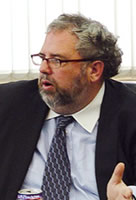Renewable energy in an integrated south-east Europe energy market
As the region opens itself to competition, Robert Howse, Professor of Law at the University of Michigan, reveals the role of international trade rules
 With the reconnection of the south-eastern Europe (SEE) power system in 2004 and the move towards privatisation and deregulation in the region, including Romania, there are now significant opportunities to create an integrated competitive electricity market.
With the reconnection of the south-eastern Europe (SEE) power system in 2004 and the move towards privatisation and deregulation in the region, including Romania, there are now significant opportunities to create an integrated competitive electricity market.
Several states in the region are not EU members yet, but almost all are members of the World Trade Organization – which means WTO rules will apply to govern cross-border trade in electricity and electricity services.
The “command and control” legacy of inefficient socialist economies has left the region with excess generating capacity and an ability to produce power from conventional sources at low marginal cost.
However, don't ignore the importance of renewable energy, given the targets for renewable energy generation and the emissions limitation targets that are now part of EU policy. While often having a higher marginal cost, this may not be more expensive if the full environmental costs and benefits of renewable vs. conventional fossil fuel-based generation are considered.
Electricity industries of multinational scope are impacted by WTO rules, however the implications may change depending on whether the international transaction involved is regarded as a commodity or as a service.
Industries entirely part of a certain nation are also affected by WTO rules if questions arise about discrimination against equipment providers from other countries. An example: technical rules for the connection of generators that could be deemed to discriminate against generator equipment providers from other countries. Different WTO rules may apply depending on whether, and to what extent, grid access is set by Government regulation.
Generally speaking, the more direct the involvement and control by Government in setting the terms of access, the more fully WTO disciplines will apply.
A further issue concerns the application of WTO rules to the management of interconnection issues between national and sub-national electricity systems by regional or transnational “grids” or by regulatory cooperation mechanisms. Such bodies are not themselves bound to follow WTO rules. However, where they create technical standards, the states that participate in them have to ensure that the standardisation process is consistent with certain kinds of due process or good governance norms.
A final consideration about WTO obligations is that they contain few requirements to take positive measures to assure network access. Thus nothing in the WTO rules would require a Government to make investments in transmission infrastructure. Also, WTO rules do not address the allocation of costs for the infrastructure needed to trade electricity across jurisdictional boundaries or the sharing of responsibility between jurisdictions for externalities of such trade (such as breakdowns in the cross boundary grid).
In sum, there may be both public and private decisions that affect grid access for international trade in electricity where WTO disciplines do not operate.
Mandatory standards are of vital importance for national grids and electrical equipment standards to have a long history. There are important legitimate reasons to impose technical requirements that burden producers of renewable energy, including reliability and security of the grid. To this end, it is not the ability of renewable sources to supply electricity on demand but, among other things, the ability to provide clean power when connected to the grid, to meet standards for low voltage ride-through, to be able to work with reasonable gate closure times and to provide facilities that can be effectively managed by the grid operator in conjunction with other energy sources.
Gate time issues are very relevant to renewable intermittent power sources, a concern for the grid operator and for international harmonisation. Here, WTO requires that technical regulations are based on international standards and that they not constitute “unnecessary obstacles to trade.”
Some traditional grid management approaches to reliability may disadvantage renewable energy but it may be possible to introduce alternative approaches to achieve the goals in question while being less restrictive of trade in electricity generated from renewable sources. This is what the Federal Energy Regulatory Commission (FERC) tries in the US.
National grids or portions of national grids wishing to interconnect with the new international grids will have to meet international standards of reliability, quality and manageability.
Furthermore, equipment hooked to national grids will also have to meet international standards particularly where such equipment will affect stability and reliability. These considerations will automatically extend to facilities producing renewable energy. Compliance with national, regional and local regulations can be a lengthy, costly and burdensome process.
Idiosyncratic local regulations may also drive up costs and hamper foreign competitors. For instance in Denmark's Greater Copenhagen Region, the regional authority has set a height restriction on wind-turbine towers of 70 metres, despite the fact that this is ten or more metres below the optimal height for constructing the most efficient modern wind turbines. Such idiosyncratic regulations may violate WTO rules where they are unnecessary obstacles to international trade.
